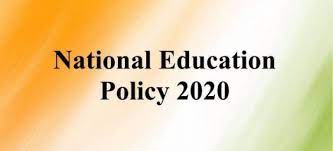Dr Parshotam S. Manhas
National Education Policy (NEP) 2020 approved by the Union Cabinet on 29th July, 2020 envisions an India-centric education system that provides high-quality education to all thereby transforming India into an equitable and vibrant knowledge society in the world. The foundational principles of NEP 2020 are Access, Equity, Quality, Affordability, and Accountability. The Policy asserts that the education system should develop good human beings with rational thinking, compassion, empathy, courage, resilience, scientific temper, creative imagination, and ethical values.
The policy envisages broad-based, multi-disciplinary, holistic education with flexible curricula, creative combination of subjects, integration of vocational education, utilisation of technology, besides multiple entries and exit options. A complete restructuring of undergraduate and postgraduate programs will ensure that certifications be awarded each year, and credits are transferable. To set the tone, the Higher Education Commission of India (HECI) will act as an overarching organization for higher education, whilst National Research Foundation (NSF) will take on the role of an apex body to foster a research-oriented mindset and build research capacities across the landscape. It is pertinent to mention that private and public institutions will be governed by the same set of principles for academic standards, accreditation and regulation. Some noteworthy provisions include – financial aid to students, expansion of open and distant learning, faculty training and motivation, and promotion of Indian languages.
The new National Education Policy will introduce four-year undergraduate programmes (FYUGP) with multiple entry and exit options with appropriate certificate within period; discontinuation of the M Phil degree, among other things. The FYUGP is divided into eight semesters and students will require 160-176 credits for a four-year degree with honours/research. According to UGC draft document: Curricular Framework and Credit System for the FYUGP, students will study a set of common and introductory courses in natural sciences, humanities and social sciences during the first three semesters, regardless of their selected stream – Science, Humanities or Commerce. The common courses include English, a regional language, courses on environmental science, understanding India, health and wellness or yoga and sports, Artificial Intelligence and big data analysis. At the end of the third semester, students will have to declare a “major”, which will be a subject they intend to study in depth. In addition to the major, a student will also have to choose two minors relating to a disciplinary or inter-disciplinary area of study, including a vocational education programme.
At the beginning of the seventh semester, each student will take up a research project along with advanced disciplinary/inter-disciplinary courses and research methodology courses. The final semester will be devoted exclusively to the research project. The project should be related to a topic in the chosen ‘major’ disciplinary programme of study or an inter-disciplinary topic that has a substantial overlap with the major disciplinary/inter-disciplinary programmes of study.
The FYUGP will be a flexible programme with options for multiple exits and entries. Students will be awarded with a certificate after completing 1 year (2 semesters) of study in the chosen fields of study, a diploma after 2 years (4 semesters) of study, a bachelor’s degree after a 3-year (6 semesters) programme of study, a bachelor’s degree with honours or research after a 4-year (eight semesters) programme.
The credit requirement at each level has also been fixed. Around 40-44 credit-hours will be required for a certificate, 80-88 for a diploma, 120-123 for a degree and 160-176 credits will be needed for a degree with honours/research. Under special circumstances, students will be permitted an extension, so as to enable them to fulfil all requirements for the degree. The FYUGP will also allow credit accumulation through the facility created by the Academic Bank of Credit (ABC) scheme. The validity of credits earned would be seven years.
After completion of a FYUGP with research with at least 7.5 Cumulative Grade Point Average (CGPA), students will be eligible to enroll for PhD courses along those pursuing or completed the postgraduate courses.
The draft framework further mandated that students have to do internships with local industry, businesses, artists, and crafts persons, among others to actively indulge in the practical aspect of their learning and improve their employability. These internships will be required before exiting the course at any point.
The significance of the FYUP will only thrive when research, internships, projects, apprenticeships, etc are all included in course design and the regular appraisals of students are carried out, often on half yearly basis.
The outcome of NEP 2020 will provide a more flexible study route in the higher education sector letting students choose their academic career, with the multiple entry and exit options, rather than conforming to the existing set standards. The 4-year UG degree programme will allow students to move towards more research-oriented learning at par with the global higher education structure. The policy also enables HEIs to offer courses not just in the face-to-face mode but also in the online or even distance mode, with the appropriate accreditation.
In short, NEP 2020 in Higher Education has set the following targets among others:
* Achieving 50% gross enrolment ratio (GER) by 2035 along with additional 3.5 crore seats;
* Phasing out the system of ‘affiliated colleges’ over a period of 15 years through a system of “graded autonomy”;
* Setting up of Multidisciplinary Education and Research Universities (MERUs):
* Internationalization of education – entry of foreign universities, student and faculty mobility;
* All HEIs to be multidisciplinary by 2040;
* Professional education to be an integral part of the higher education system.
Finally, NEP 2020 is a big revolution replacing the 34-year-old policy to bring about the much-needed transformation in the Indian Education System. The Policy has maintained a delicate balance between the traditions and the interdisciplinary approach, which is the need of the 21st century. It has the potential to remodel the skills of the youth of our country and has all the right tools that are vital to be competitive at the international level.
(The author is Associate Professor at GDC, Samba)
Trending Now
E-Paper


